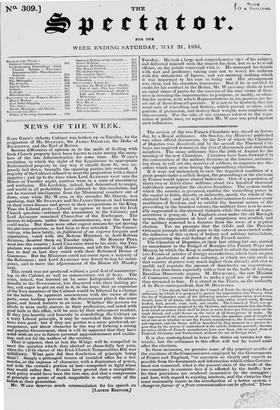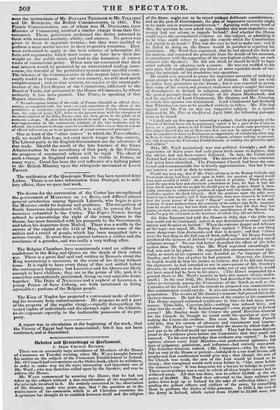The session of the two French Chambers was closed on
Saturs day, by a Royal ordinance. On Sunday, the Moniteur published two other official documents, by the first of which the Chamber of Deputies was dissolved, and by the second the Electoral Col- leges are required to meet on the 21st of this month and elect fresh members. The same ordinance fixes the 20th of August for the meeting of the new Chambers. Circulars have been forwarded to the commanders of the military divisions in the interior, authoriz- ing them to call out the reserves of soldiers, to suppress any dis- orders which may arise during the approaching elections. If it were not melancholy to view the degraded condition of a great people under a selfish despot, the proceedings at the elections in France would appear almost ludicrous. Out of a population of thirty-two or thirty-three millions, about two hundred thousand individuals monopolize the elective franchise. The system under which the country is governed, enables the controlling power in the capital to bribe, directly or indirectly, nearly the whole of the electoral body; and yet, as if with a determination to remove every semblance of freedom, and to exhibit the farcical nature of the proceeding in the broadest colours, the military force is to be actu- ally augmented in the electoral districts while the choice of repre- sentatives is going on. In England, even under the old Borough system, the appearance at least of compulsion was avoided, and the military removed to a distance from the scene of a popular election. Yet we presume that the Globe and the Parisian Orleanist journals will still point to the votes of men elected under the influence of this system of bribery and military intimidation, as representing the real feelings of the French nation. The Chamber of Deputies, at their last sitting but one, carried an amendment to the Budget of Receipts (the French Ways and Means), by which the King is authorized to admit the importation into France of articles of fareign manufacture, which form no part of the productions of native industry, or which are only made in that country at prices very much higher than abroal; and also to modify and regulate the amount of drawbacks on exportations. This was done more especially with a view to the trade of refilling Brazilian Muscovado sugars. M. DUCHATEL, the new Minister of Commerce; seems disposed to make a good use of the power thus intrusted to him. It is stated in the Times, on the authority of its Paris correspondent, that M. DUCHATEL
"has already laid before the Council of Trade the draught of a Royal
ordinance, by which it is proposed to permit the importation into France, from the 1st of September next, of the following articles—cotton .twist, wool-twist, shawls, laces of all kinds, silk handkerchiefs, iron cables, watch-work, Russian leather, lead, potash, rum, rack, and ratafia. The Council of Trade has ap- proved of the measure proposed by the Minister, and recommends that the duties to be levied on cotton twist shall be fixed at seven francs per kilogramme on the single thread, and eight francs on the twist of all descriptions of make. By the experiment a the admission of cotton .twist, the question must at length be set at rest as to whether or not the French manufacturer, the French consumer and exporter, and the State, will be benefited by that measure in a greater de- gree than by the system of contraband in the article, hitherto pursued ; because no cotton cloths of French manufacture have ever been able to equal those of England, Germany, and Switzerland, without the use of foreign twist."
It is also contemplated to lower the duties on various raw ma- terials; but the ordinance to this effect will not be issued until after the elections.
In these measures, we perceive some of the practical results of the exertions of the Commissioners employed by the Governments of France and England, "to ascertain as clearly and exactly as possible from the documents and information which either Govern- ment can command, what is the present State of the trade of' the two countries; to examine how it is affected by the tariffs ; how far their provisions are rendered inoperative by the smuggler ; and how, with regard to existing interests, and the obstacles they must necessarily create to the introduction of a better system, a change in favour of a freer communication can be effected." These were the instructions of Mr. Poutzrr THomsore to Mr. VILLIERS' and Dr. BOWRING, the British Commissioners, in 1831. The French Commissioners, one of whom was M. DUCHATEL (now Minister of Commerce), received a similar charge from their Go- vernment. These gentlemen performed the duties intrusted to them with unusual assiduity, ability, and success. No power was given to them to negotiate treaties ; but they were enabled to perform a more useful service to their respective countries. They were authorized to apply to the best sources of information for facts and arguments, which must sooner or later have their due weight on the public mind, and lead to the formation of correct views of commercial policy. When men are convinced that their real interest would be promoted by an unrestricted trading inter- course, the downfal of the prohibitory system must speedily ensue. The labours of the Commissioners in this respect have been emi- nently useful in France. In our own country, we still need much enlightenment ; and on that account, we rejoice at the recent pub- lication of the First Report of the Commission, addressed to the Board of Trade, and presented to the House of Commons, by whose authority it Las been printed. The Times, in speaking of this Report, observes, that " No such copious history of the trade of France (founded on official docu- ments), as compared with our own—no such exposition of the effects of the prohibitive or restrictive system pursued by successive French Governments from the reign of Louis XIV. down to the present time, with the exception of the short interval of the Eden Treaty—has yet been given to the public in so authentic a shape. If, after the facts disclosed in such an inquiry, no impor- tant improvement in the commercial relations of the two countries can he effected, the resistance to change must be ascribed to other causes than to a want of official information, or to an ignorance of sound commercial principles."
One at least of the "other causes" to which the Times alludes, will, we would fain hope, not exist much longer in this country. The Liberal party in the English Government are the advocates of free trade. Should the result of the late fracture of the GREY Administration be the ascendancy of that party in the Cabinet, the progress of commercial reform will be rapid. The effect of such a change in England would soon be visible in France, in Many ways. Great has been the evil influence of a halting policy in the British Ministry upon the retrograde movement of Louts Pattie.





















